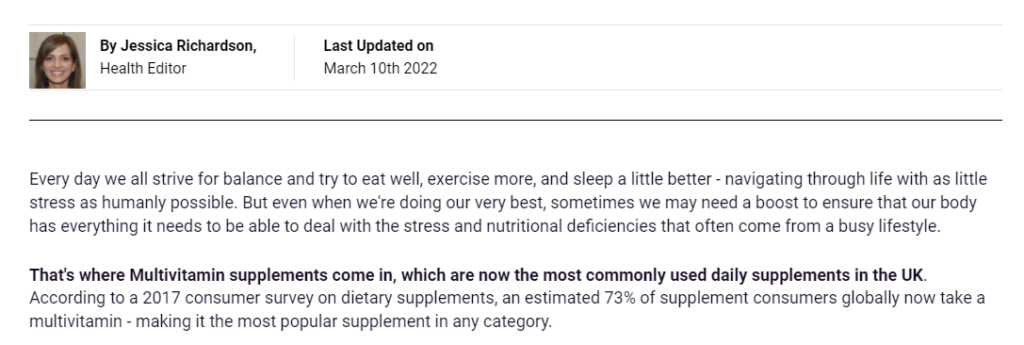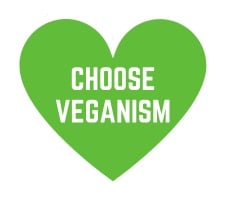Reviews can be incredibly useful when searching for the best supplements online. That’s why I’ve personally tried and tested many different brands to produce guides to the best vegan multivitamins, the best vegan omega 3 supplements and many more.
However, it’s important to know that not all review sites are the same!
So many review sites never actually try the products. So, when they say something is ‘easy to swallow’, the writer hasn’t actually tried swallowing it. In fact, they’ve never even had their hands on it.

But, it gets worse than that…
Sadly, many of the online reviews for vitamins and supplements are downright fake.
They promote cheaply made tablets that are made with low-quality ingredients and packed full of nasty additives. These cowboy supplement companies are able to attract glowing reviews from review sites. How? By paying for them.
In this guide, I’m going to show you how supplement review scams work so that you can easily spot fake supplement reviews…
How The Scam Works
1. The supplement company creates a fake independent review website
Using credible-sounding names such as ‘Clinical Reviews, ‘Trustworthy Reviews’ and ‘Wholesome Choices’, these websites appear to be independent. You would never know that the site has been created by the supplement company.
2. The company writes a roundup review of the ‘best’ products
At first glance, the reviews seem to be comprehensive – the only obvious giveaway is the use of stock images rather than real photos of the products.
The reviews are written by so-called ‘experts’ – nutritionists, doctors and professors. However, if you search for these people on Google, you’ll see that they’re completely fictional. Their photos are made using random face-generating software like this-person-does-not-exist.com.
Of course, their own product is always the number one recommendation, while competitors offering high-quality products are given subheadings like – ‘Don’t waste your money.’
3. The roundup reviews are promoted with paid ads
Google is smart, so it’s difficult to get a fake review site to the top of the Google search results. Trust me, my website, ChooseVeganism.org, gets 95% of its visitors from Google’s organic search. I can only do this because I’ve taken a lot of time to try and test every product that I recommend.
However, with paid ads, Google doesn’t care so much. The search engine is much less picky about which websites can appear at the top of the search results if it’s in the paid ads section.
Many people don’t pay attention to the difference between the block of paid ads at the top of their search engine results page and the organic listings below. So, scammers can easily get their fake reviews to the top of the results page for terms like ‘best multivitamin supplement’.
How to Spot Fake Reviews Easily
1. Beware of paid ads
When you search in Google, Bing or any other search engine, pay attention to which results are paid for. These are marked by the word ‘Ad’.
I’m not saying that all paid ads are bad, but if you choose to click on one, you should take note of who’s paying for it to appear there. Is it an independent company?
If you click on the little downward arrow next to a result, a pop-up will appear showing the name of the advertiser.
If, as in the example below, the name of the advertiser matches the name of the supplement company with the number one recommended product in the review, then you should suspect that the review isn’t independent.

2. Research the author
If a review claims to have been written by a qualified person such as a nutritionist, search for them on Google. Do they have a LinkedIn page? Does the photo on there match the photo on the article?
You can also do a reverse image search on Google to see where else the photo on the website appears.
Oftentimes, fake review sites will use the name of a real person with medical qualifications, but with a computer-generated image.
In this example, you can see that Jessica Richardson is a qualified scientist with a PhD. However, this is not the same person who wrote the supplement review.
Real Person:

Fake Persona:

3. Look at the images
When reading reviews, pay close attention to the photos of the products. Are they the same stock photos that are found on the manufacturer’s website or on Amazon? Or are they real photographs that have been taken by the person who has actually tested the product?
This is where a reverse image search can come in handy again. If the image doesn’t appear on any other website, you can be sure that it has been taken by the reviewer.
The Bottom Line
When it comes to buying supplements, it really is worth doing your research. After all, low-quality products could have the potential to do real harm.
I’d suggest reading reviews from several credible sources before making any decision about whether a particular brand is worth your money.
If you’d like to know of some companies that have been called out for fake reviews recently, take a look at this post on Medium.
